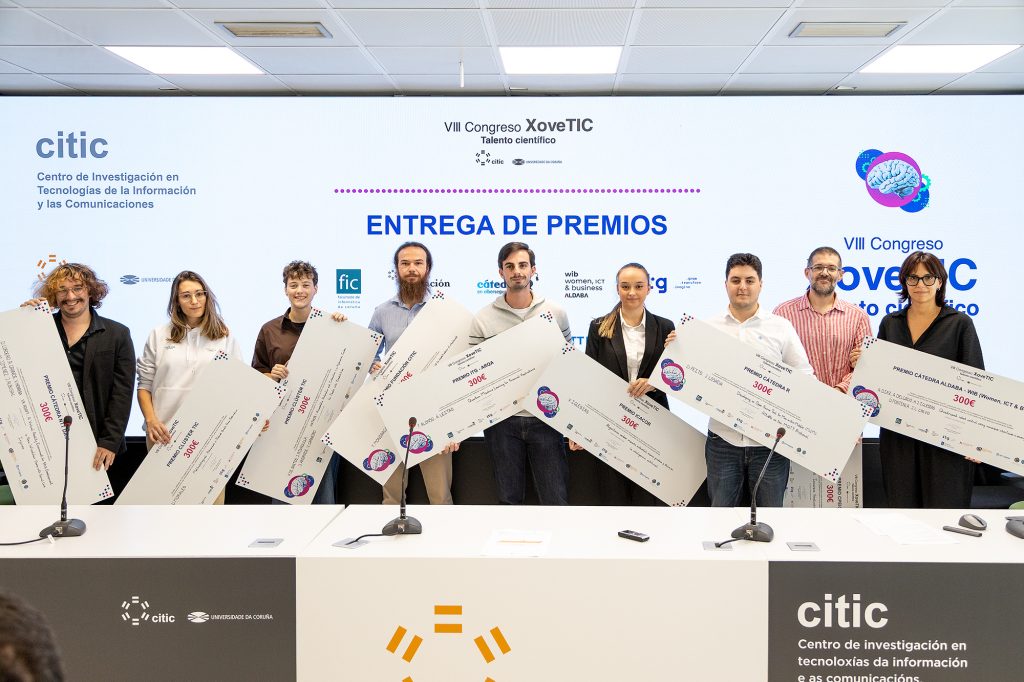
From quadruped robots to green algorithms: CITIC at UDC celebrates the innovation of Galicia’s new technological generation
- The XoveTIC Congress recognised today the best research works among more than a hundred young researchers who participated in its eighth edition, held this Thursday and Friday at the CITIC Centre and the Faculty of Computer Science of the University of A Coruña (UDC).
- The awarded projects include cybersecurity tools, virtual reality for people with spinal cord injuries, sustainable artificial intelligence, and quantum learning applied to finance.
A Coruña, 10 October 2025.– The CITIC of the University of A Coruña honoured today the best projects by young researchers at the award ceremony of the XoveTIC 2025 Congress, marking the close of its eighth edition, held over the past two days in A Coruña with the support of the Xunta de Galicia.
The winning works span a wide range of topics within computer engineering and emerging technologies, including research in cybersecurity —such as the development of tools for analysing vulnerabilities in IoT (Internet of Things) communications— and virtual reality applied to inclusion, through immersive environments that assist people with spinal cord injuries in adapting to wheelchair use or visualising accessibility-focused home renovations.
Other awarded projects address the ethical, legal, and environmental impact of AI, promoting reflection on sustainable algorithms, as well as the control of quadruped robots through immersive interfaces for emergency response operations. Further distinctions went to work in quantum machine learning for financial applications and studies on complex data classification methods combining quantum and classical techniques, even in cases of highly unbalanced datasets where certain data types are much more frequent than others.
The award ceremony, presided over by CITIC’s Deputy Director, Javier Pereira Loureiro, brought together representatives from the university chairs and partner organisations sponsoring the nine awards for the most outstanding research projects.
XoveTIC 2025 Award Winners
- Cátedra R – “For the most relevant work in the field of security, broadly understood to include cybersecurity in ICT as well as safety in other domains”:
- Daniel Feito Pin and José Losada for “Developing an Open Source Tool for Man-in-the-Middle (MitM) Attacks on the MQTT Protocol”.
- Cátedra NTT Data – “For the most relevant work in diversity, social economy, and the promotion of equality”:
- Diego Cordero Contreras, Rubén Grande, Vanesa Herrera, Mario Jiménez and Javier Albusac for “VR-ADAPT: A Virtual Reality Environment for Skill Development in New Wheelchair Users with Spinal Cord Injuries”.
- ICACOR (Ilustre Colexio Provincial de Avogados da Coruña) – “For the most relevant work in the ethical and legal field”:
- Vera Iglesias Losada for “Green Algorithms: Environmental, Legal and Ethical Frameworks in Artificial Intelligence”.
- Cátedra ALDABA – WIB (Women, ICT & Business) – “For the most outstanding work led by a woman as first author”:
- Anabel Díaz-Labrador, Ángel Delgado, Héctor J. Pérez-Iglesias, Óscar Fontenla-Romero and José Luis Calvo-Rolle, for “Quadruped robot control using immersive interfaces in emergency contexts”.
- ITG – ARQA – “For the most outstanding work in quantum technology”:
- Fernando Alonso and Álvaro Leitao Rodríguez for “Quantum Machine Learning for Financial Applications”.
- CPEIG – “For the best work authored by a student or graduate in Computer Engineering”:
- Xoel Penas, Javier Taibo, José A. Iglesias-Guitián and Emilio J. Padrón for “Immersive Visualization of Home Renovations for Accessibility Using Virtual Reality”.
- Clúster TIC Galicia – “Best Poster”:
- Paula de Santos Dorrego, Jorge Rivadulla Brey, Javier Andrade Garda and Víctor Carneiro Díaz, for “HATHOR – Accessible Automation and Interaction in a Hydroponic Garden for People with Disabilities”.
- Clúster TIC Galicia – “Best Oral Communication”:
- María Bugallo Porto and Domingo Morales González for “Methodological Advances in Robust Small Area Estimation”.
- Fundación CITIC de Galicia – “For the most relevant contribution in basic or theoretical research”:
- Fernando Mondragón Sampedro and Diego Álvarez Estévez for “Quantum and classical kernels applied to classification of unbalanced datasets”.
Innovation with Impact
Following the award ceremony, the closing event of the 8th XoveTIC Congress was chaired by José Anta Álvarez, Deputy for Knowledge Transfer at UDC, accompanied by Juan Ignacio Borrego Vázquez, Councillor for Education, Training and Technological Innovation at A Coruña City Council; Javier Pereira Loureiro, CITIC Deputy Director; Elena Hernández Pereira, Vice-Dean for Institutional Relations at the Faculty of Computer Science; and Andrés Sastre Portela, Project Director at Cluster TIC Galicia.
“It is a source of pride for CITIC to recognise the talent and dedication of our young researchers, who prove every day that technological innovation can have a tangible impact on society,” said Javier Pereira Loureiro, CITIC Deputy Director. “Projects like those awarded today —spanning cybersecurity, applied artificial intelligence, and inclusive virtual reality— reflect the diversity of areas in which our students and doctoral candidates are driving meaningful advances.”
He added, “These awards not only recognise scientific excellence but also the social commitment of those building responsible and sustainable technological solutions capable of improving people’s lives and contributing to a more inclusive and secure future.”
Institutional representatives also highlighted the high scientific level and international outlook of the congress, as well as the key role of CITIC and UDC as spaces fostering young talent and knowledge transfer.
About CITIC
CITIC is a research centre promoting excellence and progress in applied R&D&I in ICT. Established in 2008 by the University of A Coruña, its scientific activity is structured into four main research areas: Artificial Intelligence; Data Science and Engineering; High-Performance Computing; and Intelligent Services and Networks. A transversal area covers all of them: Cybersecurity.
CITIC is accredited as a Centre of Excellence and a member of the CIGUS Network for the 2024–2027 period, endorsing the quality and impact of its research. The accreditation, structure, and enhancement of CITIC are co-funded by the Xunta de Galicia and 60% by the European Union under the ERDF Galicia 2021–2027 Operational Programme, within the thematic objective of promoting “a smarter Europe: innovative and intelligent economic transformation” (ED431G 2023/01).





